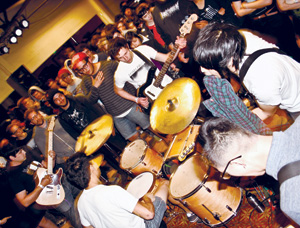

FOR FIVE YEARS, the members of San Jose hardcore band Matsuri have been screaming in sweaty garages and relentlessly banging their instruments at full volume. But for their newest album, they learned a new trick: how to hold back.
“We’re more cognizant of the sound we’re making, how everyone’s parts fit in with each other’s. There is an interaction to everyone’s specific part. That takes restraint,” says guitarist Andrew Yeung.
The band spent the better part of eight months meticulously writing and recording Endship. The resulting concept album is a collection of complex, multilayered songs with dramatic highs and lows. There are moments that are as loud and angst-ridden as Matsuri’s earlier music, while other parts are gorgeous, gentle and carefully crafted, using a now three-guitar lineup by having each guitarist play distinct interacting parts.
The seemingly mismatched sections have a natural flow since they were written with an overall arc in mind, as opposed to simply pasting interesting sounding sections together.
“We wanted to make the whole album connected in a way that was seamless,” says drummer Jonathan Ruiz.
As they wrote Endship, their practices often started with discussions about what the intended emotional and symbolic feelings for each song should be. For instance, one song idea was simply “something dirty that blossoms into something beautiful,” guitarist Thomas Nguyen explains.
The songs are connected with a single theme: relationships. That broad theme allows each member to approach it in a way that was personal to him.
“Each of us had a different idea what relationship we were talking about. Our relationship to our friends. Our relationship to our family. Our relationships to our environment,” says Nguyen.
How they chose to incorporate this theme varied as well, from the lyrics to how the music sounded and any other way that was meaningful. The idea was to create an album where they were uninhibited artistically but still making a cohesive piece of work.
Sometimes their discussions got so long that they consumed more of their practice time than playing their instruments. “We were talking about themes, asking each other ‘What do you think? What do you want this to feel like?’ It was constant. Everyone talked about what they wanted,” Gough explains.
Despite the lengthy recording process, they also wanted it to sound organic, so they recorded all the instruments in single takes. This led to several days of playing the same songs over and over again until they got that perfect take. Fortunately for their pocketbooks, they recorded the album themselves in their garage.
But recording this way wasn’t just a financial decision. It was a reflection on a fundamental aspect of the band. “We hold DIY important. Everyone collectively sees this as a healthy alternative of art instead of the commodification of it,” Yeung asserts.
With that ethic in mind, they started putting on shows themselves a year ago at a house where three of the five members live. The house, known as the Texas Toast Haus, has hosted more than 70 shows in the past 12 months and helped to create a thriving DIY scene in San Jose. They’ve brought in countless touring bands and given San Jose a live-music spot that is a vibrant alternative to the 21+ bar scene, where there is more concern about selling drinks than promoting art.
“People associate us with the Texas Toast Haus, and I could not be happier with that,” Gough says.
Indeed, sometimes the line between Matsuri and the Texas Toast Haus is blurry. But their attitude about both is the same. They want to keep doing them as long as they are able to do so with the same degree of integrity.
“You open your house to people and hope nothing bad happens, and honestly, nothing bad has happened,” says Chris.
“We want to create art, inspire people and build community,” Nguyen says. “We’re trying to have a good creative space. It becomes less about us as musicians and more about the community.”
Matsuri opens for Hard Girls
Saturday, 8pm; $8
X Bar, Cupertino


